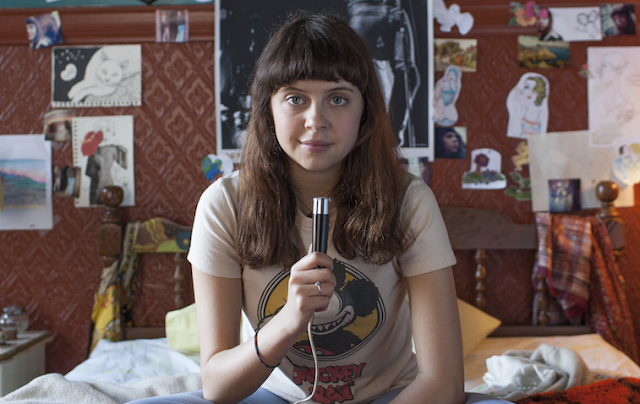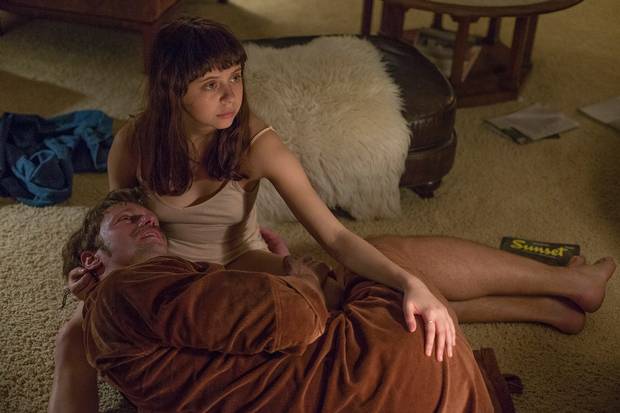The very first line of The Diary of a Teenage Girl, Marielle Heller’s uneven, appealing coming-of-age story, is “I had sex today”; it is immediately followed by a very Fifty Shades of Grey-like exclamation, “Holy shit!” But despite her youth and initial lack of worldliness, Minnie Goetze (Bel Powley) is no Anastasia Steele. She is not timid, nor is she entranced by notions of masculine dominance. She is instead a confident, eager, and often foolish femme who does not apologize for her desires, even if she does not entirely understand them. “I like sex,” Minnie tells us early on, and in case you didn’t believe her, she clarifies, “I really like getting fucked!” That may strike some as vulgar, but the most satisfying thing about The Diary of a Teenage Girl—beyond the powerful performance at its center—is its frankness in discussing sexual desire and its attendant emotions. Minnie is the hero of her story, she wants sex, and she refuses to cast herself as the victim.
Though she is very much that, at least in one sense. Minnie, as you may have gleaned from the film’s title, is a teenager—fifteen, to be precise. That’s young enough as it is, but it becomes alarmingly so once you learn that the person she is so happily, repeatedly tumbling into bed with is her mother’s thirtysomething boyfriend, Monroe (Alexander Skarsgård). Yet Heller, who also wrote the screenplay (adapting Phoebe Gloeckner’s novel), is not interested in the legal or moral ramifications of Minnie and Monroe’s illicit union. She is more concerned with exploring how it makes Minnie feel: how it affects her sense of self, her demeanor, and, most distressingly, her relationship with her mother (a very good Kristen Wiig). In so doing, Heller puts a tremendous amount of weight on Powley, a 23-year-old British actress appearing in her first American feature (the movie takes place in 1970s San Francisco). She shoulders the load with aplomb, capturing Minnie’s vitality and hunger while also revealing glimmers of her fragility.
Powley’s performance is easily the best thing about The Diary of a Teenage Girl, which, while tender and true, often feels aimless and skittish. Minnie is an aspiring comic-strip artist, and Heller allows her internal visions to play out on screen. Thus, inanimate objects regularly come to hand-drawn life, fake birds flit in and out of frame, and Minnie even summons an imaginary confidant (Aline Kominsky-Crumb, Harry Crumb’s wife) to provide companionship and advice. (At one point, Minnie herself sprouts wings and floats above the room, a literal flight of fancy.) This approach, which unavoidably recalls the superior American Splendor (and also the Australian animated curio, Mary and Max), is gratifyingly bold, even if it can also feel tacky. It highlights Minnie’s spirit of creativity while also underlining the mundanity of the movie’s narrative.
That narrative mostly involves Minnie’s torturous relationship with Monroe, and boy is he a piece of work. A pitiful lecher with a constitution that’s even weaker than his mustache, Monroe is less a villain than an insect, a creature that is somehow both predatory and pathetic. Even his moments of decency are revolting; when he finally attempts to end the affair, it isn’t because he realizes that he should probably stop sleeping with his girlfriend’s underage daughter—it’s because he feels wounded. “You’re manipulating me!” he cries to Minnie. I suppose it is a credit to Skarsgård, an actor who is typically hunky and charismatic, that you spend most of the movie wanting to punch Monroe in the face.
Minnie never does, probably because she’s too busy making her own dubious decisions, experimenting with drugs, boys, and girls, as when she falls in briefly with a wrong-side-of-the-tracks temptress named Tabatha (Adventureland‘s Margarita Levieva, making a heck of an impression in a handful of minutes). In other words, she acts like a confused teenager. And overall, The Diary of a Teenage Girl is a heady rush of feeling that is more notable for its general intimations of youthful longing than for its precise articulation of it. It nobly conveys the universality of Minnie’s journey, but despite Powley’s soulfulness, it struggles to make that journey specific. (One noteworthy exception: While phoning a friend to discuss her sexual exploits, Minnie speaks only in yes-or-no sentences, convinced that her younger sister is eavesdropping outside the door.) But there is still value in watching a young girl achieve womanhood, not through sex, but through greater appreciation of her own self-worth. In a way, The Diary of a Teenage Girl shares the characteristics of the scribbles in an adolescent’s notebook. It has little substance, but a whole lot of heart.
Jeremy Beck is the editor-in-chief of MovieManifesto. He watches more movies and television than he probably should.


